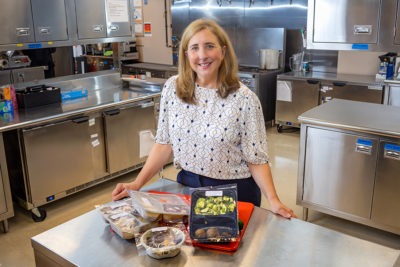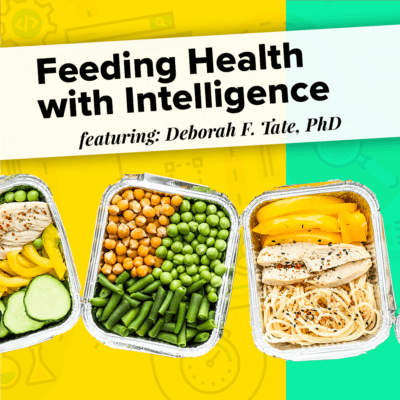A new article written by Megan Mendenhall for UNC Research Stories explores how artificial intelligence (AI) is transforming science—and how Carolina researchers are using it to improve human health. UNC Research Stories is a digital storytelling series from UNC Research that brings the work of Carolina scientists to life through in-depth features and photography.
In “AI Insights,” Mendenhall begins by explaining how AI works and its long-standing role in technology development, then focuses on UNC-Chapel Hill researchers like Deborah Tate, PhD, professor at the Gillings School of Global Public Health and interim director of the UNC Nutrition Research Institute.
Artificial intelligence (AI) is quietly working behind the scenes in many aspects of everyday life — from personalized recommendations on apps like Netflix and Spotify to predictive text and autocorrect features on smartphones.
And while it feels like AI has only existed for the last few years thanks to the emergence and growing popularity of agents like ChatGPT, the technology has a long and exciting past, stemming back to the 1950s when scientists wondered if machines could think and learn like humans. Early work focused on creating programs to solve problems, play simple games, and understand language. By the 1980s, scientists developed systems mimicking human expertise in specific fields. But the big breakthrough happened in the 2000s and 2010s with the rise of machine learning, a subfield of AI that enables computers to learn and improve from data without requiring explicit programming.
Instead of being given specific instructions on how to perform a task, machine learning algorithms learn from data to identify patterns. There are generally two types: supervised learning, which is trained on data to make predictions, and unsupervised learning, which isn’t.
These advances use AI to analyze vast amounts of data — and the technology keeps getting smarter. AI has the potential to serve as the foundation for the iterative process, allowing users to build on existing knowledge and gain new insights. Because of this, it is also revolutionizing research across various fields.
UNC-Chapel Hill researchers are leveraging AI in a variety of ways. Some are harnessing its power to advance health care by creating innovative diagnostics and personalized treatment plans that improve patient outcomes. Others are using it to analyze vast data sets, decode complex problems, and unlock new ways of understanding.
“As someone who’s always seen technology as a potential solution, AI is another advancement that can help us find answers,” says Deborah Tate, a nutrition professor in the UNC Gillings School of Global Public Health and interim director of the UNC Nutrition Research Institute. “It provides the opportunity to make extremely rapid advances. But while it’s exciting, it’s only as good as you train it to be.”
Creating personalized food plans

Deborah Tate is a professor of Nutrition and Health Behavior within the UNC Gillings School of Global Public Health, the director of the Communication for Health Applications and Interventions and the interim director of the UNC Nutrition Research Institute.
(Megan Mendenhall / Office of Research Communications)
Imagine a future where a person’s diet can be customized to align perfectly with their body’s unique makeup, helping to prevent the effects of chronic and progressive diseases like obesity, diabetes, and cardiovascular disease.
This vision is the driving force behind Nutrition for Precision Health, powered by the All of Us Research Program. This $170 million investment from the National Institutes of Health Common Fund aims to explore how genetics, gut bacteria, environment, and lifestyle influence our responses to food. What makes this initiative particularly innovative is its use of AI.
“Historically, we’ve been looking at the average effects. For every intervention we’ve tried, half the people have succeeded, and half the people haven’t,” explains Deborah Tate, who is co-leading the study with nutrition professor Elizabeth Mayer-Davis. “We’re trying to move away from what works best on average to what works best for the individual.”
The goal is to develop algorithms to retreat from one-size-fits-all diets and instead personalize nutrition for each person’s unique needs. These algorithms look at weight, age, blood sugar levels, and other health information to predict a food regimen that can meet specific health goals like controlling blood sugar or lowering blood pressure. These advances provide unprecedented opportunities to generate new data offering insight into precision nutrition.
“Many of these lifestyle changes have profound impacts on health, and it’s been undersold because we have not been personalizing,” Tate shares. “So, imagine our ability to use AI to help personalize in real-time to find the right intervention and support so that prevention reaches its full potential and people live healthier lives.”
Continue reading the full story here.

